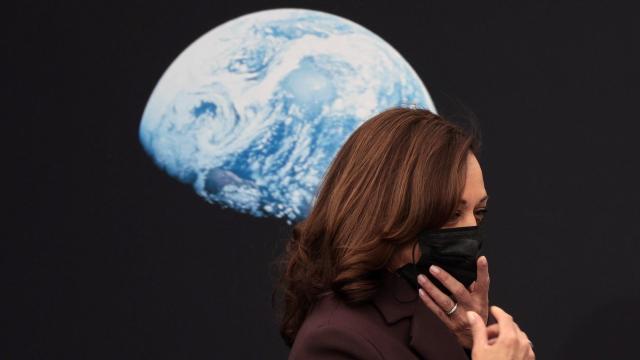About two weeks ago, Russian authorities conducted a massive missile test that blew up one of its own orbiting satellites, sending at least 1,500 pieces of dangerous debris showering across space and forcing both astronauts and nearby spacecraft to careen out of their path. Now, the Biden Administration is calling for a new set of international regulations designed to keep space safe (or at least relatively safe) for the growing number of people and corporations operating there.
“Without clear norms for the responsible use of space, we stand the real risk of threats to our national and global security,” Vice President Kamala Harris said during the annual National Space Council meeting on Wednesday afternoon.
“Just last month, we saw what can happen. Russia launched an anti-satellite missile to destroy one of its satellites,” she told the audience. “By blasting debris across space, this irresponsible act endangered the satellites of other nations as well as astronauts in the International Space Station.”
To give an indication of how intertwined this administration believes the future of the United States and space exploration is, the National Space Council will now include the secretaries of Education, Labour, Agriculture, Interior, and the national climate adviser.
Russia’s direct-ascent anti-satellite test — or ASAT, for short — was the third-ever example of a nation launching ballistic missiles against one of its own satellites: the first was China, in 2007, and the second was India in 2019. Both cases sent a worrying amount of space junk flying, but Russia’s destruction of one of its (now-defunct) Soviet-era satellites has drawn particular ire from U.S. officials. The same day Russia conducted its test, the U.S. Space Command issued a public statement saying that the move would pose “a significant risk” to the crew onboard the International Space Station for years to come. At Wednesday’s meeting, Pentagon officials echoed those worries, with Department of Defence deputy secretary Kathleen Hicks calling for a global halt to any anti-satellite tests.
Harris, for her part, serves as chair of the National Space Council. Before her first meeting at the helm, the White House released a seven-page “Space Priorities Framework” that’s meant to address the two core priorities that it’s set for the Council under the current administration: first is “maintaining a robust and responsible U.S. space enterprise,” and second is “preserving space for current and future generations.”
Space preservation doesn’t only mean keeping space junk to a minimum, according to the Framework. It also means better understanding space traffic coordination in a solar system that’s increasingly clogged by private companies, like Elon Musk’s Starlink and Jeff Bezos’s Blue Origin. It also means creating some sort of global governance to keep countries from needlessly throwing the International Space Station into peril.
